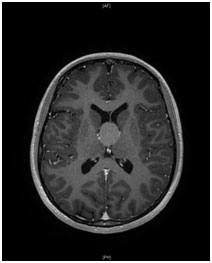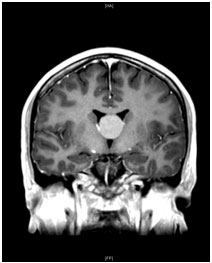

What is a colloid cyst?
Benign, slow growing tumour composed of a thin sac containing a thick mucinous liquid.
What causes colloid cysts?
At present there is no known cause for this tumour.
Where do colloid cysts occur?
They are found within a fluid cavity in the brain called the IIIrd ventricle.
How do colloid cysts affect your health? What symptoms do they cause?
Because of their location, they most often present with symptoms relating to obstruction of the fluid pathway and accumulation of brain fluid (hydrocephalus).
Symptoms include:
- Headaches
- Short term memory loss
- Drop attacks (sudden brief loss of consciousness)
- Sudden death
Occasionally these tumours are picked up incidentally with no obvious symptoms.
What happens after I am diagnosed with a colloid cyst?
Please see patient journey after diagnosis of a brain tumour
What is the current recommended treatment for colloid cysts?
How is surgery done for colloid cysts?
Open surgery
- Interhemispheric, transcallosal approach
- Trans frontal
Endoscopic
For details on these procedures please discuss with your surgeon.
How quickly do these grow?
Colloid cysts are very slow growing tumours
What if I don’t have surgery?
Not all colloid cysts need to be operated on. If they are picked up when they are small, they can be observed with regular MRI scans
Large ones causing symptoms, are life threatening and so must be operated on as soon as possible.
What other treatments are available?
The best treatment is surgery to remove the entire tumour. This is almost always possible.
Occasionally there might be a need to do something more minimal such as
- Insertion of ventriculo peritoneal shunt
- Stereotactic aspiration of cyst
Both of the above still involve surgery.
This tumour is not responsive to radiation or any drug therapy.

















